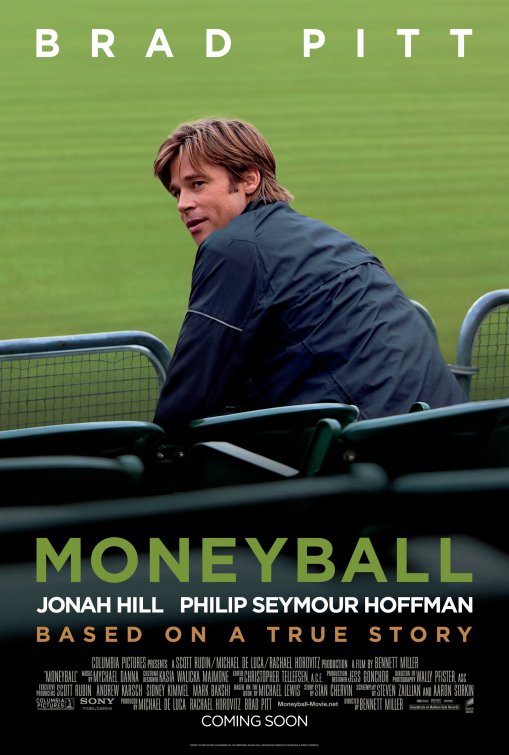*Ignoring the fact that The Girl with the Dragon Tattoo star, and Best Actress Nominee, Rooney Mara is the great-grand daughter of NFL royalty- the Steelers' founder Art Rooney Sr. and the New York Giants' founders Tim Mara.
Moneyball begins in late 2001 as the Oakland A's are taking on the New York Yankees in the playoffs, with footage of Jason Giambi and Johnny Damon taking their last at bats as members of the A's. It's not long after they, and pitcher Jason Isringhausen, sign long and expensive deals with other teams that the A's have no hope of matching. This sets up the main conflict of Moneyball: How does such a poor team replace such expensive players?
 |
| Brad Pitt as Billy Beane |
The search for not the best player but the right player is the focus is not only Brand's approach, using various forms of metrics and algorithms consisting of an emphasis on reaching base, but also the approach of Beane. His past as a highly touted prospect who fizzled out with the Mets, Twins, Tigers and A's drives him to look beyond the flash of the players who look great but aren't really players.
Using the unique approach created by Brand retreads and maybe-will-be's like Scott Hatteberg (Parks and Recreation's Chris Pratt), David Justice (Stephen Bishop), and Miguel Tejada (former MLB All Star Royce Clayton) sign contracts to be a part of the new Oakland A's.
 |
| Jonah Hill as Peter Brand |
It isn't long after these changes that things begin to fall into place. The A's begin to surge. Win after win after win piles up and their record grows and grows. Suddenly they find themselves on the verge of history, knocking on the door of an MLB record 20 consecutive wins, a feat they attain in a 12-11 victory over the Kansas City Royals, whose winning run was a home run knocked in by Hatteberg.
The movie ends solemnly, however. The A's would go on to lose once again in the playoffs, this time to the Minnesota Twins. The small market team is once again vanquished in the first round of the playoffs. It is all for naught.
 |
| Chris Pratt as Scott Hatteberg |
Nominated for six Academy Awards, including Best Picture, Best Actor, Best Supporting Actor, and Best Adapted Screenplay, Moneyball is no slouch of a film. In the end its biggest flaw is just that, the end. There is no major pay off. There is no fairy tale ending. The A's go on to lose in the playoffs as usual. It remains true to the real tale, as hollow as it may feel. However, the lack of trophy for the players shouldn't mean a lack of trophies for the film.
_________________________________________________________
Follow Case and Point on Twitter, Foursquare and Facebook to be the first to learn about new articles, podcasts, and breaking sports news. Get in touch with Case and Point at contact@caseandpointsports.com


No comments:
Post a Comment